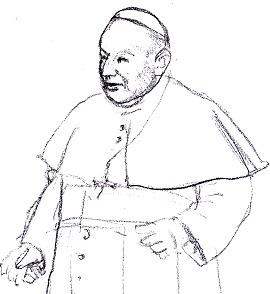
“Every kingdom divided against itself will be laid waste” (Luke 11:17).
The Lectionary readings assigned to today have an edge that seems contrary to the spirit of the commemoration of St. John XXIII, whose decision to call the Second Vatican Council (1962-65) marked the rebirth of the church in the modern world. The Prophet Joel warns that the “day of the Lord” is near, a cause for fear and trembling, and in Luke’s Gospel, Jesus warns that a “house divided against itself will fall.”
But perhaps if we listen to both the Word and the memory of Pope John, we may better understand his concern for the church when he was elected in 1958. The institution he inherited from Pius XII was in a kind of lockdown against modernity, had become a doctrinal museum and ecclesiastical fashion show in denial of the growing movements for liberation and self-determination happening around the world.
The meeting of over 2,000 bishops that Pope John convened brought progressives and conservatives together on a full range of issues needed to reform the church and renew its mission. John wanted the church to be a mother and teacher (Mater et Magistra), not a scold or only a stern father figure. He wanted a church attentive to the poor, more transparent and open to science, culture and other world religions. Failure to change, he knew, would exclude the church from the table where critical decisions about the future were being made by others.
Pope John trusted the Holy Spirit to bring the church through a difficult process still united in love. Jesus likewise was always trying to draw his critics into a deeper understanding of God’s love. He faced opponents who accused him of heresy and even demonic possession, to which he replied that his power to expel evil spirits was proof he was not in collusion with Satan. Only the Spirit of God could produce the miracles of healing and reconciliation he was doing, for the “finger of God” was at work through him, and this was evidence that “the Kingdom of God has come upon you.”
Pope Francis recently said that current divisions in the church did not concern him, and he asked his critics to dialogue with him instead of spreading dissension indirectly, like enemies casting stones from the crowd to hide their identities. The way of the Spirit is encounter, dialogue and accompaniment. We are all responsible for unity in the church, for being open to those we disagree with and willing to dialogue with love.
The Holy Spirit drives out lesser spirits of fear and ambition, competition and aggression. Controversy is inevitable, but if it leads to honest discourse and patient listening, unity is possible and everyone is blessed.
Advertisement








